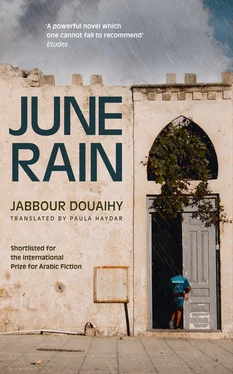All the talk reached her ears though she hid inside the house. She named him Eliyya after the last saint she had made supplications to. The saints had defeated her. She had thought she’d been released from her debt to them. She had trouble choosing between naming him Yusef after his father or naming him Eliyya. Kamileh was afraid of Saint Elias; his vengeance might be severe and she couldn’t bear that.
If only she could pick him up and fly away — a white swan spreading her immense wings, picking him up by his nappies with her beak as he slept all pink-cheeked and tender, his hands and little legs dangling in mid air. She’d pick him up and fly away to the ends of the earth, to lands where she didn’t know anyone. A voice whose owner she couldn’t see would guide her. A man’s voice like her father’s voice. She, the swan, would set him down from her long beak in a natural nest between two rocks high up in a mountain, far away from all the eyes and all the predators, so she could go out to battle every day and come back to him with food. She would fight with everything she had — her beak, her wings, her legs. She’d be wounded all over but she wouldn’t die. Her enemies were everywhere, in the air, behind the rocks, between the grains of sand and over the waves of the sea. She woke up from her dream to his cries of hunger. She gave him her breast and they both fell deeply back to sleep. The white swan would never return to her after that night.
Eliyya grew up and went to school. He was a skinny boy with a weak constitution and weak eyesight. She accompanied him to class, to the same room her father had removed her from back then. She wanted to know who the boy sitting next him was, wanted to know who his father and mother were.
‘Do not hit him, do you hear?’
The high praise for Eliyya began at the start of his school days. ‘He’s clever,’ the nun in charge of the small children would say. He was top of his class in every subject.
Kamileh forbade him to participate in gym class. She made a special request of the administration to excuse him from athletics.
‘Can’t you see how skinny he is?’ she’d say, looking at him.
Muntaha thought he looked like Kamileh. Kamileh would gaze at him at length without seeing the resemblance.
People’s eyes were quick to attack him. And so were their tongues. As soon as he was able to understand, they began saying things to him. The words were already on their tongues, poised and waiting for someone to hear them.
The words were on women’s tongues especially, spinsters in particular. They attacked little Eliyya on the streets, sought him out. One of them would start asking him questions, with her hand on her hip and her jaw hanging open, ‘Whose son are you, honey?’
He couldn’t understand the woman’s question. It embarrassed him, and he wouldn’t know how to answer.
The woman would smile. She’d ask him his name and he’d answer. Then she’d repeat the first question.
‘Whose son are you, Eliyya?’
He’d look at her with big, wide eyes, not answering. The woman would be satisfied with that. The child’s silence was a confession.
He didn’t tell his mother, but she knew. She knew and kept it buried inside.
Sometimes she would get upset. She’d blow up over a word or a look or nothing at all, pouring out her anger on young and old alike. She began cursing people out loud, on the street, as she walked by. She cursed them for no reason, talked to herself in a loud voice, and clashed with the people who had ruined her life.
Eliyya enjoyed competing, with words and by fighting. One time he and one of his buddies in the quarter were exchanging insults. A bad word here, a curse there, swearing against family and relatives, until Eliyya finally outdid his opponent with a good dose of adjectives. The other boy had no recourse but to pelt him with, ‘Son of Kamileh!’
He tossed it out there in the context of their contest.
‘You pygmy!’ Eliyya exclaimed, full of confidence, his clear proof being the short stature of his opponent.
‘You’re a sicko!’ his opponent said, targeting Eliyya’s leanness and gaunt face. This was fired at Eliyya without any need for proof.
‘Lettuce seller!’ Eliyya spouted off, mocking the occupation of his opponent’s father who was a greengrocer. This was Eliyya’s first venture into that type of exchange.
The insult caught Eliyya’s opponent off guard because Eliyya had now opened the door on fathers, where he had the advantage. Eliyya’s opponent had been disarmed, and he hesitated, not finding a way to respond. He looked around hoping for some help; a young man around twenty years old leaned over and quickly whispered something in his ear. The younger boy squealed with joy as if he’d found some long lost object.
‘Son of Kamileh!’
A short silence followed, broken by laughter that resounded the moment the bystanders understood the meaning of the accusation. Those who understood and those who didn’t all laughed. It was as though Eliyya’s opponent had won the victory on points and deserved acclaim from the audience. Eliyya hesitated. He got flustered for a minute and then he suddenly started throwing rocks at his rival, an indication that words had reached their limit and the only response left was to hurt him directly. When his opponent ran away, Eliyya rushed home, angry and crying. He, too, hadn’t understood exactly what happened, but he felt the sting of the insult when everyone laughed.
From the kitchen and from the balcony, Kamileh constantly tried to watch over Eliyya. She worried what they might do to him and wished he wouldn’t go out into the streets, because he didn’t know what was waiting for him out there. She, on the other hand, did know and expected the worst. Being stabbed with a knife would have been easier for her to bear than his tears. She consoled him and decided then and there to send him to the Sisters of the Holy Cross School. And to anyone who asked her about it she said, ‘I don’t have any others beside him and this is a difficult environment here. He learns all sorts of bad things from them. If I leave him to his own devices he won’t learn anything.’ By which she meant ‘school learning’. She visited him there at his new school twice a week. She cooked for him, fed him, gazed at him. But she didn’t want him to come back home. She couldn’t stand the holidays when the school would send him home to her with his accordion. She’d invent all sorts of reasons for him not to leave the house. But they sought him out and would congregate below the balcony hoping he would join them.
They could say she had no feelings and didn’t miss her son as much as they wanted, just as long as they kept their dirty looks away from her — their dirty looks and nasty tongues. She remembered what her brother-in-law, Yasmeen’s husband, was always saying, ‘Staying far away from all of you is a blessing!’
She sent him far away and remained steadfast and alone. But they didn’t forget and wouldn’t forget even after a hundred years. They never said anything to her face, they didn’t dare, but she got the feeling from their little questions — ‘How’s Eliyya doing? We hear he’s very clever’ — from the way they dragged out the question and curled their lips — ‘Did he find himself a nice girl, your son, huh Kamileh, over there?’ She felt they were still lying in wait for her. And now she didn’t want to undergo the cataract surgery because she didn’t want to see what was in their eyes, what was still in their eyes, because what was in their voices was more than enough for her. Maybe the reason her eyesight weakened was so that she wouldn’t have to see them anymore. She didn’t want to see them and she didn’t want Eliyya to come back home. The further away from her he remained, the easier life was for her and for him. By herself, her head butting against theirs, they couldn’t get the best of her, but she wouldn’t be able to fight them off with him standing next to her.
Читать дальше












